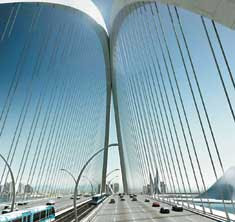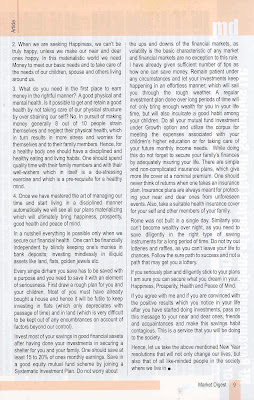Market crash: A quick guide for young investors rediff Get Ahead Bureau
If you are young and restless and into the stock markets then this is for you.
For the Indian stock markets are caught in a whirlwind and you might need a straw to hold on to something. Some words of wisdom, some nuggets that may help you to relax, howsoever often you may have heard them before.
Waking up this morning would you have imagined the 30-stock benchmark index, the Sensex, would crash by more than 1,500 points after noon?
The US markets seemed a bit stable with the Dow Jones down by about 0.5 per cent. The Indian stocks too had been on a downslide since January 15. However, the shock and awe that the Sensex witnessed today must have made a few of the weak-hearted amongst you stop and take heed.
Weak-hearted we all are but if you also have some patience -- considering your age -- here's what you should keep in mind to weather stock market turbulences.
1. Start nibbling inIf you believe in India's growth story every steep fall should be seen as a buying opportunity. If you haven't yet entered the market but want to then tighten your belts. Market crash like the one today is an ideal time to buy. However, since these are very tumultuous times don't put all your eggs in one basket.
That is, if you have Rs 100 to invest then put only Rs 25 or even less during such crashes. If you have heart for some risk then put Rs 25 out of that Rs 100 today and keep the rest for later. However, do this only if you are willing to stake your money for at least five-seven years. The long-term stock market story in India still looks positive.
2. Don't panicIf you are already invested in the market and are sitting on huge losses, don't panic. The macro economic story in India led by the consumption, infrastructure and engineering sectors still have chances to remain insulated from what's happening in the US markets. This because many believe that the US recession is responsible for the current weakness across global markets.
If the US can't buy our goods, no problem. India and Indians have the purchasing capacity believe some experts, who say that the US recession will not have a huge impact on the Indian growth story.
Moreover, India's demographics, skewed heavily in favour of the young, will help India overcome external pressures in the long run. Young Indians like you are spending more on their daily needs thereby increasing the consumption demand.
So if you are a brave heart and believe that there are bound to be minor hiccups along the way this is your time. Add more and good quality stocks to your portfolio.
3. Avoid averagingIf you are a short-term trader and think that you can buy more of the same stocks to average your buying price then you may be in for a rough ride. Nobody knows for sure about which direction the markets will take in the weeks ahead.
Any bad news coming from global giants like the US, Europe and China can only have multiplier effects. If the markets were to tank further your losses are likely to increase manifold. So book your losses and get out of the market.
However, if you want to invest with a long-term perspective start nibbling in on good quality stocks.
4. Don't go by tipsIf you are young and eager to make money then you are an ideal target for those who give stock tips. They will start flying thick and fast from tomorrow. Or may have started doing rounds even today for all we know. Some of your friends will ask you to buy stocks; some other will advise you to sell them.
Agreed you will find a lot many stocks at prices far lower than what they were a fortnight ago. Check for their credentials. For this is the time when gullible investors go for the bait thrown by stock market manipulators. Don't buy any stock merely because a broker or a market punter advised you to.
Similarly, there will be a host of technical advisors jostling for your attention. "This particular stock looks weak on the charts. Traders can make some profits by selling them now and buying the same at lower levels with strict stop losses." Shun the thought. For you never know when the markets will bounce back.
Bottom line: don't trade on tips. Better still don't trade at all. Go for long-term investments. For the time being forget what Lord Maynard Keynes said: "In the long-term we are all dead."
God knows what will happen in the long-term but in the current scenario if you were to act on tips then you will only be responsible for your own ruin.
5. Mutual funds are your best friendsIn such times let experts manage your money if you find stock markets to be a hot potato. Put your money in mutual funds for the mutual fund manager is a market expert and is assisted by a big team of market specialists. A decision made by a team of experts will help you make far greater profits than what you will try to do on your own.
The stock market hammering of the last few days should be taken as an opportunity to buy into good diversified equity funds. For, they put their money into the markets irrespective of any sector, theme, or market cap limitation.
When the markets will bounce back they will have a far higher chance of appreciating faster than any other type of mutual funds.
6. Don't try to time the marketsAs an individual you are in no way going to buy when the market falls and sell when the market rises. Believe in investing money into stocks or mutual funds' systematic investment plans, SIPs, regularly. This is the only key to avoid getting ruined in the stock markets.
The stock market crashes -- like the one witnessed today -- get evened out by long-term gains. For instance, those who had been regularly investing from the time markets crashed steeply during the May 2006 crash would not feel bothered about the crash today.
The market had crashed to some 12,000 points then from about 16,000 levels in just a month's time. Today even after the crash the market was trading at 17,000 plus levels.
Remember that age is on your side. If you are in your early, mid or late twenties then this is the right time for you to put your money in stock markets. Historically, stock market gains have outweighed gains from other asset classes over 10-year, 15-year and 20-year time horizons.
Who knows, by the time you are in your 40s or 50s, twenty years from this day, you might look back at this crash as your first stepping stone towards building wealth for yourself and your family.

























